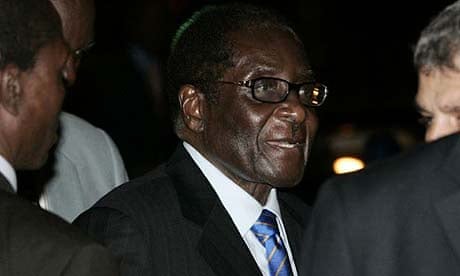The Zimbabwean government yesterday banned the opposition presidential candidate, Morgan Tsvangirai, from holding political rallies three weeks ahead of his run-off election against Robert Mugabe.
The police told Tsvangirai of the ban, ostensibly over concerns for his safety, when he was arrested for a second time this week while trying to campaign. But the move appears to reflect a growing concern in Mugabe's camp that its strategy of violence, intimidation and nationalist appeals will not be sufficient to ensure victory in the June 27 vote after Tsvangirai won the first round in March but fell just short of an outright majority.
The Foreign Office condemned the ban on campaigning: "Nothing we've seen since the first round suggests that Mugabe has changed. He's trying to steal the election now exactly as he did in the first round."
The ban on opposition rallies came a day after the government barred international aid agencies, including the United Nations, from working in Zimbabwe for the duration of the election campaign.
The US described the restrictions as further evidence that Mugabe wants to control food distribution to use it as a political weapon to blackmail Zimbabweans into voting for him.
But aid workers said they believed it is also an attempt to prevent them from witnessing the escalating state-sponsored attacks on the opposition Movement for Democratic Change and its supporters in rural areas. The MDC says more than 60 of its activists and supporters have been murdered by pro-Mugabe militias or security forces and thousands more have been severely beaten.
The UN described the new restrictions as "scandalous" and warned that children will be particularly vulnerable to the cutback in food deliveries to about
4 million people - one-third of the population - who rely on aid to survive. Unicef, the UN's children's agency, said that about 180,000 will be seriously at risk from curbs to nutrition and healthcare.
Britain described the restrictions on aid agencies as a reflection of Mugabe's "callous contempt for human life".
Tsvangirai was attempting to campaign in Bulawayo, Zimbabwe's second city, when he was detained and taken to a police station about 30 miles from the city. He was released after about two hours but with a warning that he was not permitted to campaign any more, according to his spokesman, George Sibotshiwe.
"We are dismayed that our president has not been allowed to access the Zimbabwean people at a crucial stage in this campaign," he said.
The security forces had already blocked Tsvangirai from holding rallies by sending soldiers to occupy stadiums booked by the MDC and to intimidate ordinary people into staying away. But the MDC leader had continued to hold small, sometimes impromptu, meetings.
Sibotshiwe said the claim by police that the formal ban was solely intended to protect Tsvangirai and other MDC leaders was "nonsense" and "a clear indication that the regime will do everything necessary to remain in power". Zanu-PF was clearly shocked after the first round of elections at the inroads Tsvangirai made into the ruling party's former strongholds, particularly in Mashonaland. The MDC leader had campaigned heavily in rural areas for the first time because of the relative lack of violence compared to other recent elections.
Mugabe has evidently fallen back on violence once again but in banning foreign aid agencies, and detaining British and American diplomats on Thursday, the authorities evidently do not want outside witnesses. On Thursday, foreign aid organisations were ordered to suspend field work indefinitely. Mugabe this week accused NGOs of acting as a front for western support for the MDC.
The UN's Office for the Coordination of Humanitarian Affairs (OCHA) said the ban would severely hamper assistance to millions of people. "These restrictions are also coming at a time when food security in Zimbabwe is deteriorating, leaving an increasing number of people vulnerable," Elisabeth Byrs, a spokeswoman for OCHA, told the Associated Press.
Two British aid agencies affected by the ban, Save the Children and Christian Aid, condemned it. Christian Aid described the restrictions as certain to have an "extremely detrimental effect" and "frightening".
In London, the international development secretary, Douglas Alexander, told Channel 4 News that Mugabe's use of "the threat of hunger as a political weapon in his re-election strategy shows a callous contempt for human life".
